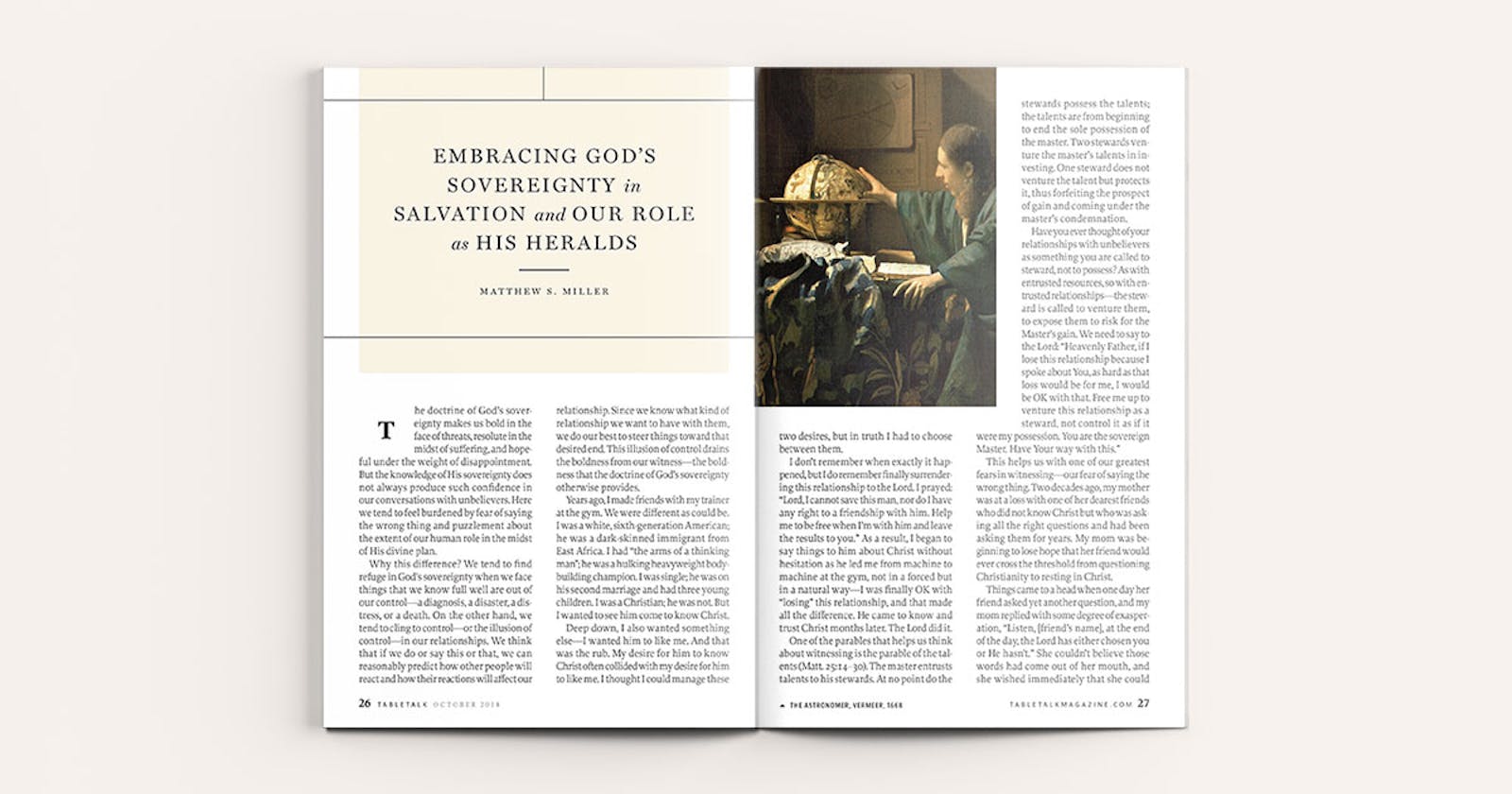
Request your free, three-month trial to Tabletalk magazine. You’ll receive the print issue monthly and gain immediate digital access to decades of archives. This trial is risk-free. No credit card required.
Try Tabletalk NowAlready receive Tabletalk magazine every month?
Verify your email address to gain unlimited access.
The doctrine of God’s sovereignty makes us bold in the face of threats, resolute in the midst of suffering, and hopeful under the weight of disappointment. But the knowledge of His sovereignty does not always produce such confidence in our conversations with unbelievers. Here we tend to feel burdened by fear of saying the wrong thing and puzzlement about the extent of our human role in the midst of His divine plan.
Why this difference? We tend to find refuge in God’s sovereignty when we face things that we know full well are out of our control—a diagnosis, a disaster, a distress, or a death. On the other hand, we tend to cling to control—or the illusion of control—in our relationships. We think that if we do or say this or that, we can reasonably predict how other people will react and how their reactions will affect our relationship. Since we know what kind of relationship we want to have with them, we do our best to steer things toward that desired end. This illusion of control drains the boldness from our witness—the boldness that the doctrine of God’s sovereignty otherwise provides.
Years ago, I made friends with my trainer at the gym. We were different as could be. I was a white, sixth-generation American; he was a dark-skinned immigrant from East Africa. I had “the arms of a thinking man”; he was a hulking heavyweight bodybuilding champion. I was single; he was on his second marriage and had three young children. I was a Christian; he was not. But I wanted to see him come to know Christ.
Deep down, I also wanted something else—I wanted him to like me. And that was the rub. My desire for him to know Christ often collided with my desire for him to like me. I thought I could manage these two desires, but in truth I had to choose between them.
I don’t remember when exactly it happened, but I do remember finally surrendering this relationship to the Lord. I prayed: “Lord, I cannot save this man, nor do I have any right to a friendship with him. Help me to be free when I’m with him and leave the results to you.” As a result, I began to say things to him about Christ without hesitation as he led me from machine to machine at the gym, not in a forced but in a natural way—I was finally OK with “losing” this relationship, and that made all the difference. He came to know and trust Christ months later. The Lord did it.
One of the parables that helps us think about witnessing is the parable of the talents (Matt. 25:14–30). The master entrusts talents to his stewards. At no point do the stewards possess the talents; the talents are from beginning to end the sole possession of the master. Two stewards venture the master’s talents in investing. One steward does not venture the talent but protects it, thus forfeiting the prospect of gain and coming under the master’s condemnation.
Have you ever thought of your relationships with unbelievers as something you are called to steward, not to possess? As with entrusted resources, so with entrusted relationships—the steward is called to venture them, to expose them to risk for the Master’s gain. We need to say to the Lord: “Heavenly Father, if I lose this relationship because I spoke about You, as hard as that loss would be for me, I would be OK with that. Free me up to venture this relationship as a steward, not control it as if it were my possession. You are the sovereign Master. Have Your way with this.”
This helps us with one of our greatest fears in witnessing—our fear of saying the wrong thing. Two decades ago, my mother was at a loss with one of her dearest friends who did not know Christ but who was asking all the right questions and had been asking them for years. My mom was beginning to lose hope that her friend would ever cross the threshold from questioning Christianity to resting in Christ.

Things came to a head when one day her friend asked yet another question, and my mom replied with some degree of exasperation, “Listen, [friend’s name], at the end of the day, the Lord has either chosen you or He hasn’t.” She couldn’t believe those words had come out of her mouth, and she wished immediately that she could take them back. It had been an unguarded moment. But do you know what? The Lord used that moment to break through to the heart of her friend, who trembled at the thought that she might not be chosen, and she immediately moved to be reconciled with Christ. She has been walking with Him ever since. That “unguarded moment” was a moment when my mom risked the whole thing—just as stewards do.
This also helps us with our greatest theological objection to witnessing—if God has already chosen who will believe, why should we witness at all? In reality, this is simply a subset of a broader question—if God is sovereign over everything, why should we do anything? Why plant and harvest crops? Why have and raise children? Why get an education? Why get out of bed? The answer to all of these questions for the Christian is the same: by His sovereign arrangement, God has called us to express that we belong to Him by faithfully stewarding what He has entrusted to us. He has entrusted to us our bodies, so we plant and harvest and plan our meals. He has entrusted to us our minds, so we read and study and learn. He has entrusted to us a progeny, so we have children and raise them. And He has entrusted to us relationships with those who do not (or do not yet) believe, so we give a faithful witness to the gospel of Jesus Christ. In all of these things, not just the last of them, God is utterly sovereign, and the results are His. But in all of these things, including the last one, we are called to express that we belong to our sovereign Lord and to express that belonging as faithful stewards.
When we think of God’s sovereignty, we think of God’s “control,” “determination,” “predestination.” But we should also think of God’s “mine.” “Whatever is under the whole heaven is mine,” He declared to Job (Job 41:11). As the sovereign Lord, He has the right to do what He will with the things that are His. Those things include our relationships with unbelieving spouses, children, parents, neighbors, and friends. What relationships in our lives do we need to offer up to the sovereign Lord as “His,” and then treat as a stewardship to be ventured for His glory, not a possession to be controlled for our preferred outcome?
As you learn to think and pray in these ways, we will gradually find witnessing less daunting and more natural. We will find a new joy in our relationships with unbelievers as we no longer carry the false burden of control and a new boldness in our conversations as we feel free to leave the results to the Lord. All of this is possible because He is a good, wise, and altogether sovereign Lord who “from all eternity, did, by the most wise and holy counsel of His own will, freely, and unchangeably ordain whatsoever comes to pass” (Westminster Confession of Faith 3.1).
